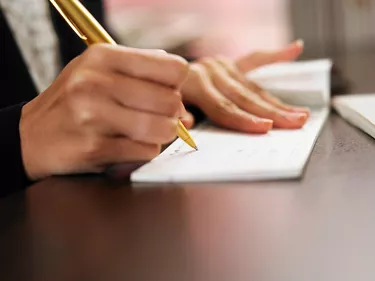
A bank account number is a unique number, often consisting of eight to 12 digits, which is assigned to your account for purposes of identification. Account numbers are designed to be complex in an effort to protect your account from identity thieves and other fraudulent activity. The routing number is a nine-digit number assigned by the American Bankers Association (ABA) to all financial institutions, to identify from which institution a payment was drawn.
Illegal Bank Account Access
Video of the Day
It is possible for an individual to access your bank account with the account number and routing number. An experienced identity thief or fraudster can piece together enough information to access your money, or set up a fraudulent account using your information. According to the U.S. Department of Justice, identity theft and fraud such as illegal access to bank accounts represents a common financial crime during the first decade of the 21st century, and the crime scene is often the World Wide Web.
Video of the Day
Importance of Account Numbers
The account number for your checking account is typically the last eight to 12 digits of the series of numbers that are found on the bottom-left of your checks. The number is meant to be complicated in order to eliminate the possibility of two separate accounts having the same number.
Checks come with your entire bank account number and routing number printed on them, and they often have your name, address and phone number, as well. Some individuals even choose to include their driver's license number on their checks. All of this information put together spells easy access for an experienced fraudster.
Importance of Routing Numbers
Overall, the routing number found on your checks is less sensitive information than your account number. A routing number is a uniquely identifying nine-digit number assigned to every bank, and it is essentially public information. Nevertheless, your bank's routing number in the hands of the wrong individual could put your bank at risk for fraudulent activity, such as the printing of fraudulent cashier's checks.
Bank routing numbers can be misused by fraudsters. But generally, your personal bank account should be safe, unless your account number has been compromised as well.
Precautions for Banking Details
With an increasing number of people participating in online banking, it raises the chance that an individual can access your bank account with the account number and routing number. Even if a check has been voided, it is a good idea to shred it or tear it up into small pieces before discarding it. The same should be done with any deposit slips remaining when you have used the last check in a booklet.
It is advisable to never offer your bank account information over the phone or in an email. If you receive an email asking for personal bank account information, you should respond by calling your bank directly to verify the email. Most financial institutions are not going to ask for verification of account numbers or other personal information in an email.
If you store financial information on your computer, make sure it is password-protected, and do not write down the passwords.